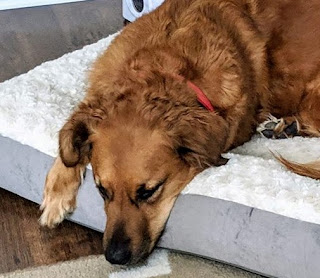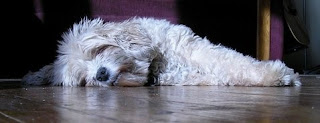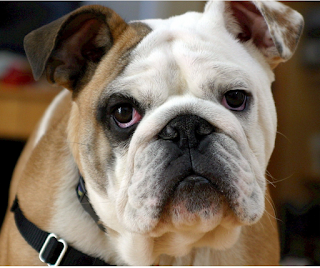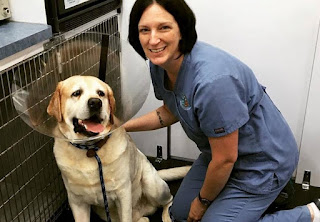What could possibly ruin a snuggly night in bed with your favorite fuzzy canine? Snoring! That incessant snort and wheeze that keeps you tossing and turning all night!

Why is your dog snoring?
Is that a problem?
Often when a person snores, they end up with a diagnosis of sleep apnea: a serious condition that can become life threatening. Fortunately sleep apnea almost never occurs in our dog friends.

Dogs who snore often have snored their entire lives, due to the conformation of their heads. Dogs with short noses are classified as brachycephalic. Common brachycephalic breeds include pugs, boxers, bulldogs, and shih tzus. These dogs have been bred to have very short muzzles, but they still have normal-length soft palates (the fleshy back aspect of the roof of the mouth). When the dog rests, the long floppy palate hangs down the throat, causing a snore sound with each breath. Often these dogs adapt to their short muzzles, but in some cases surgery is needed to reduce the size of the soft palate.

If your dog slept quietly for years and has just recently begun snoring, she may have developed a medical problem that interferes with her breathing during sleep. Any inflammation of the airway can cause snoring. Inflammation can result from allergies, trauma, infection, or irritants like perfumes or smoke. Obstruction of the airway can also cause snoring. Your veterinarian will check your dog for polyps and other types of tumors that can grow in the throat. Additionally, your vet may need to ensure that the larynx is opening fully with each breath.

Some dogs snore simply because they are sleeping in an odd position. Try waking your dog to see if his snoring goes away once he is sleeping in a different position. Obesity will also contribute to snoring. Excessive weight, especially around the chest and belly, will put pressure on the airways and cause noisy breathing. In rare cases, there is a neurological problem resulting in snoring, so it is always important to seek your veterinarian’s advice.
Here are some additional red flags to look for.
– Your dog used to be a quiet sleeper, but now he snores.
– Other symptoms in addition to snoring are present, particularly if your dog is coughing, sneezing, or dropping food out of her mouth.
– Your dog has trouble swallowing, chokes on his food, or develops a droopy side of his face.
– Snoring is accompanied by excessive panting or lagging behind on walks.

Usually a snoring dog is just that: a snoring dog. But snoring can be a symptom of several types of serious conditions. Your veterinarian and her staff are there to answer your questions. If you are concerned about your dog’s snoring, just ask us!